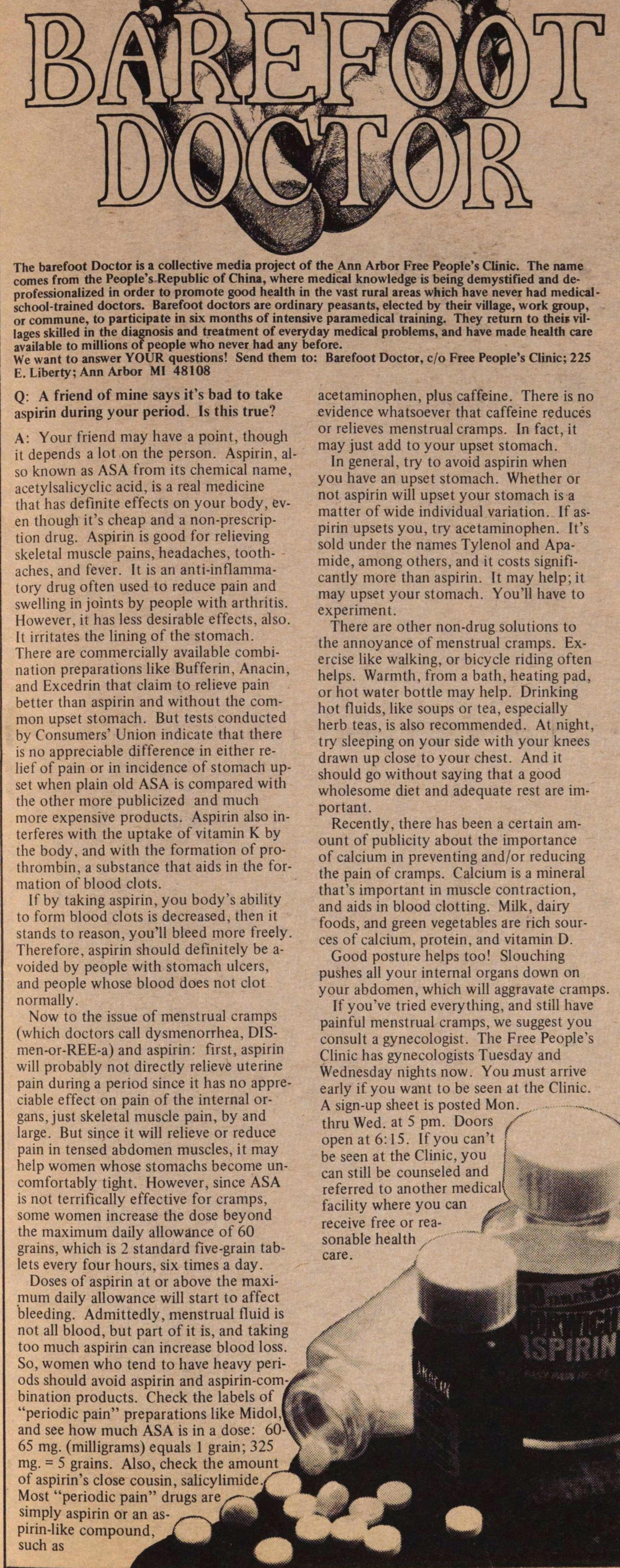Barefoot Doctor

The barefoot Doctor is a collective media project of the Ann Arbor Free People's Clinic. The name comes from the People's Republic of China, where medical knowledge is being demystified and de-professionalized in order to promote good health in the vast rural areas which have never had medical - school-trained doctors. Barefoot doctors are ordinary peasants. elected by their village, work group, or commune, to participate in six months of intensive paramedical training. They return to their villages skilled in the diagnosis and treatment of everyday medical problems, and have made health care available to millions of people who never had any before.
We want to answer YOUR questions! Send them to: Barefoot Doctor, c/o Free People's Clinic; 225 E. Liberty; Ann Arbor MI 48108
Q: A friend of mine says it's bad to take aspirin during your period. Is this true?
A: Your friend may have a point, though it depends a lot on the person. Aspirin, also known as ASA from its chemical name, acetylsalicyclic acid, is a real medicine that has definite effects on your body, even though it's cheap and a non-prescription drug. Aspirin is good for relieving skeletal muscle pains, headaches, toothaches, and fever. It is an anti-inflammatory drug often used to reduce pain and swelling in joints by people with arthritis. However, it has less desirable effects, also. It irritates the lining of the stomach. There are commercially available combination preparations like Bufferin, Anacin, and Excedrin that claim to relieve pain better than aspirin and without the common upset stomach. But tests conducted by Consumers' Union indicate that there is no appreciable difference in either relief of pain or in incidence of stomach upset when plain old ASA is compared with the other more publicized and much more expensive products. Aspirin also interferes with the uptake of vitamin K by the body. and with the formation of prothrombin, a substance that aids in the formation of blood clots.
If by taking aspirin, you body's ability to form blood clots is decreased, then it stands to reason, you'll bleed more freely. Therefore, aspirin should definitely be avoided by people with stomach ulcers, and people whose blood does not clot normally.
Now to the issue of menstrual cramps (which doctors cali dysmenorrhea. DIS-men-or-REE-a) and aspirin: first, aspirin will probably not directly relieve uterine pain during a period since it has no appreciable effect on pain of the internal organs, just skeletal muscle pain, by and large. But since it will relieve or reduce pain in tensed abdomen muscles, it may help women whose stomachs become uncomfortably tight. However, since ASA is not terrifically effective for cramps, some women increase the dose beyond the maximum daily allowance of 60 grains, which is 2 standard five-grain tablets every four hours, six times a day.
Doses of aspirin at or above the maximum daily allowance will start to affect bleeding. Admittedly, menstrual fluid is not all blood, but part of it is, and taking too much aspirin can increase blood loss. So, women who tend to have heavy periods should avoid aspirin and aspirin-combination products. Check the labels of "periodic pain" preparations like Midol, and see how much ASA is in a dose: 6065 mg. (milligrams) equals 1 grain; 325 mg. = 5 grains. Also, check the amount of aspirin's close cousin, salicylimide. Most "periodic pain" drugs are simply aspirin or an aspirin-like compound, such as acetaminophen, plus caffeine. There is no evidence whatsoever that caffeine reduces or relieves menstrual cramps. In fact, it may just add to your upset stomach.
In general, try to avoid aspirin when you have an upset stomach. Whether or not aspirin will upset your stomach is a matter of wide individual variation. If aspirin upsets you, try acetaminophen. It's sold under the names Tylenol and Apamide, among others, and it costs significantly more than aspirin. It may help; it may upset your stomach. You'll have to experiment.
There are other non-drug solutions to the annoyance of menstrual cramps. Exercise like walking, or bicycle riding often helps. Warmth, from a bath, heating pad, or hot water bottle may help. Drinking hot fluids, like soups or tea, especially herb teas, is also recommended. At night, try sleeping on your side with your knees drawn up close to your chest. And it should go without saying that a good wholesome diet and adequate rest are important.
Recently, there has been a certain amount of publicity about the importance of calcium in preventing and/or reducing the pain of cramps. Calcium is a mineral that's important in muscle contraction, and aids in blood clotting. Milk, dairy foods, and green vegetables are rich sources of calcium, protein, and vitamin D.
Good posture helps too! Slouching pushes all your internal organs down on your abdomen, which will aggravate cramps.
If you've tried everything, and still have painful menstrual cramps, we suggest you consult a gynecologist. The Free People's Clinic has gynecologists Tuesday and Wednesday nights now. You must arrive early if you want to be seen at the Clinic. A sign-up sheet is posted Mon. thru Wed. at 5 pm. Doors open at 6:15. If you can't be seen at the Clinic, you can still be counseled and referred to another medical facility where you can receive free or reasonable health care.
Article
Subjects
Freeing John Sinclair
Old News
Ann Arbor Sun